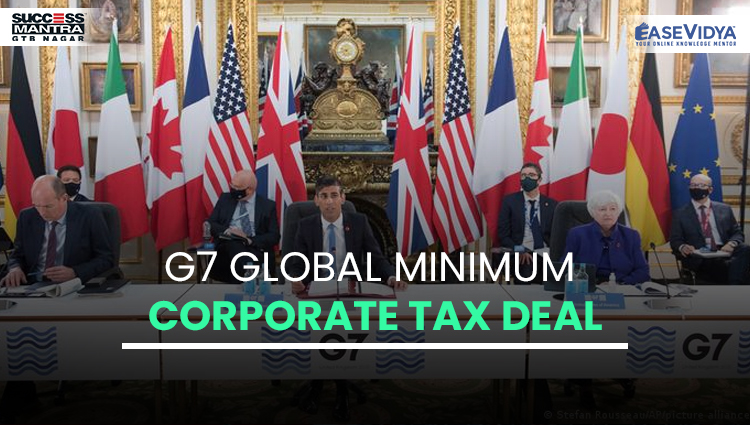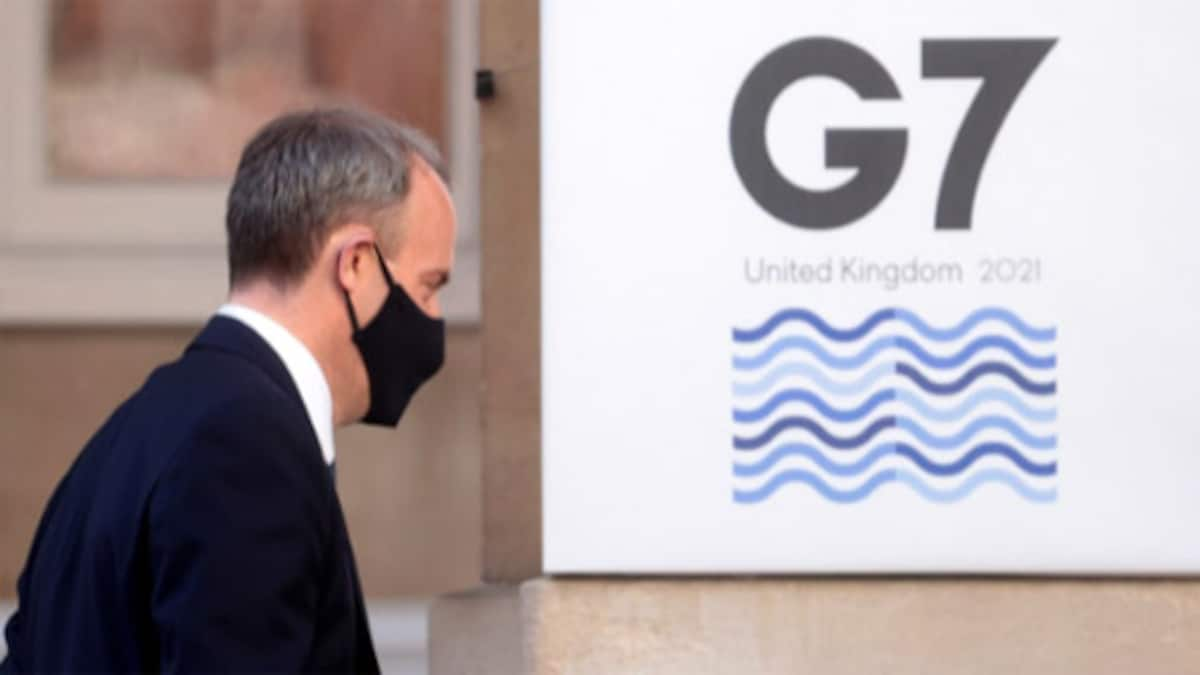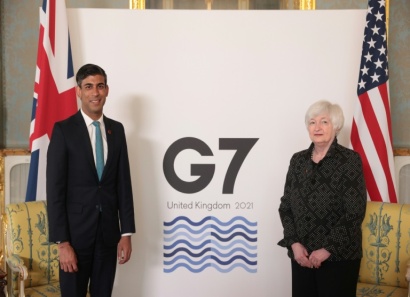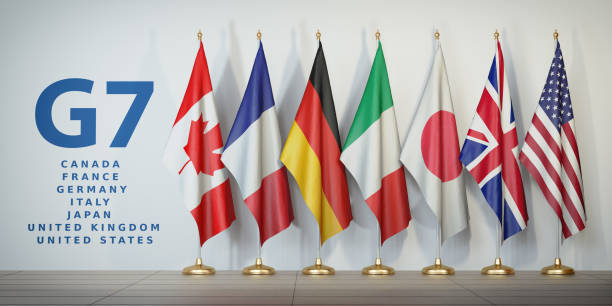
G7 GLOBAL MINIMUM CORPORATE TAX DEAL
G7 GLOBAL MINIMUM CORPORATE TAX DEAL

Recently, the Finance Ministers from the Group of Seven (G7) nations reached a landmark accord setting a Global Minimum Corporate Tax Rate (GMCTR). The agreement could form the basis of a worldwide deal. It will now be discussed in detail at a meeting of G20 financial ministers and central bank governors in July 2021. G7 also agreed to move towards making companies declare their environmental impact in a more standard way so investors can decide more easily whether to fund them.
GLOBAL MINIMUM CORPORATE TAX RATE
- G7 would back a minimum global corporation tax rate of at least 15%, and put in place measures to ensure taxes were paid in the countries where businesses operate. Corporation tax is a direct tax imposed on the net income or profit that enterprises make from their businesses.
- Applicability: It would apply to companies’ overseas profits. Therefore, if countries agree on a global minimum, governments could still set whatever local corporate tax rate they want. But if companies pay lower rates in a particular country, their home governments could “top-up” their taxes to the agreed minimum rate, eliminating the advantage of shifting profits to a tax haven. A tax haven is generally an offshore country that offers foreign individuals and businesses little or no tax liability in a politically and economically static environment.
NEED OF GMCTR
Reduce Tax Loss: Increasingly, income from intangible sources such as drug patents, software and royalties on intellectual property has migrated to low tax jurisdictions, allowing companies to avoid paying higher taxes in their traditional home countries (tax base erosion of the higher-tax jurisdictions). These companies typically rely on complex webs of subsidiaries to hoover profits out of major markets into low-tax countries such as Ireland or Caribbean nations such as the British Virgin Islands or the Bahamas, or to central American nations such as Panama. India’s annual tax loss due to corporate tax abuse is estimated at over USD 10 billion.
To Bring Uniformity: GMCTR will end a decades-long race to the bottom in which countries have competed to attract corporate giants with ultra-low tax rates and exemptions. And it will bring uniformity in corporate taxation worldwide.
CHALLENGES RELATED TO IT

- Uniting Nations: Getting all major nations on the same page is a problem, since the GMCTR impinges on the right of the sovereign to decide a nation’s tax policy.
- Policy Issues: A global minimum rate would essentially take away a tool that countries use to push policies that suit them. A lower tax rate is a tool they can use to alternatively push economic activity. Also, a global minimum tax rate will do little to tackle tax evasion.
- Other International Effort: The Organization for Economic Cooperation and Development (OECD) has been coordinating tax negotiations among 140 countries for years on rules for taxing cross-border digital services and curbing tax base erosion, including a global corporate minimum tax.
- India’s Stand: While taxation is ultimately a sovereign function, and depends upon the needs and circumstances of the nation, the government is open to participate and engage in the emerging discussions globally around the corporate tax structure. India is likely to benefit from the global minimum 15% corporate tax rate pact as the effective domestic tax rate is above the threshold, and the country would continue to attract investment. In September 2019, the government had reduced the corporate tax rate to 22% for companies that gave up all exemptions and incentives. Further, a 15% rate was offered to new manufacturing firms. The effective tax rate, inclusive of surcharge and cess, for Indian domestic companies is around 25.17%.
GROUP OF SEVEN (G7) BACKGROUND

The G7 was created as a consultation of industrialized economies, all of which have been democracies since the grouping’s origins in 1975. The original G6 included the United States, Japan, Germany, France, the United Kingdom, and Italy, with Canada joining to make the G7 by 1976. Russia participated in the G8 from 1998 to 2014 until its invasion of Ukraine’s Crimea caused the group to eject it.
SIGNIFICANCE OF G7 SUMMIT FOR INDIA
- America First To America is Back: Former US President Donald Trump’s “America First” policies weakened the US hegemony. Now US President Joe Biden is determined to strengthen US alliances and draw India into a new global architecture.
- Need for a Strong G-7 Coalition: The need for reinvigoration of G-7 emanates from the challenges put forward by increasingly aggressive China, the urgency of mitigating climate change, and the construction of a post-pandemic international order. These challenges are generating an unprecedented convergence between the interests of India and the West.
- G-7 to G-11: Not a long time ago, U.S. President Donald Trump announced that the G-7 of the world’s most developed nations was “outdated” and proposed to expand it. Now, the move to invite India, Australia, South Africa and South Korea to this can be seen as a possible step onwards upgradation of G-7 to G-11. The idea of a G-11 also can emerge as a global democratic coalition and India is at the very heart of this narrative. Further, the proposed G-11 grouping would recognise India’s place amongst the world’s richest nations, and acknowledge its global voice.
- Countering China: India now can’t escape the conclusion that China is the greatest obstacle to India’s global aspirations. Thus, forming a western pivot which includes strong bilateral strategic cooperation with the US, France, UK, EU as well as the Quad can help India counter China. India is also eager to emerge as a critical node in future supply chains oriented to the democratic world, including in the area of vaccine production.
- Easing Navigation Among Great Powers: With Russia also invited at the G-7 summit, India now hopes that a renewed dialogue between US and Russia can lead to a relaxation of tensions between them and will ease India’s navigation among the great powers.












Geoffrey
3 Ways That The Kayleigh Wanless Porn Star Can Influence Your Life subscribe
Jennifer
Nine Things That Your Parent Taught You About Tiktok.Pornstars tiktok.pornstars (https://repo.Gusdya.net/kayleighwanless6561/1587031/Wiki/10-Inspirational-Graphics-About-Prettiest-Pornstar)